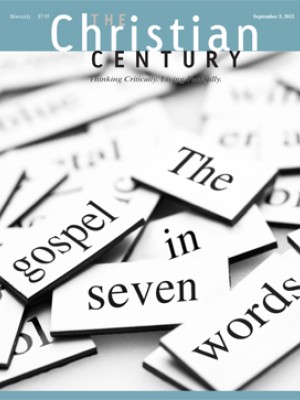The gospel in seven words

In his autobiography Brother to a Dragonfly, Will Campbell recalls how his friend P. D. East had badgered him for a succinct definition of Christianity. East did not want a long or fancy explanation. “I’m not too bright,” he told Campbell. “Keep it simple. In ten words or less, what’s the Christian message?”
Campbell obliged his friend: “We’re all bastards but God loves us anyway,” he said. To which East replied, “If you want to try again, you have two words left.”
Campbell and East eventually had an extended conversation provoked by Campbell’s summary. It had stuck in East’s mind. He wasn’t sure he bought it, but it gave him something to think about.
The Century invited some authors to try their hand at summarizing the Christian message. We instructed them to proclaim the gospel in a maximum of seven words and expand on their statement in a few sentences. It’s instructive to see what Christian proclamation boils down to when someone is put on the spot and has only a few words. What is the essence of the essence of Christianity?
Read our latest issue or browse back issues.
The exercise can have practical benefits. Christian leaders often need to have what business consultants call an “elevator speech”—a quick way to sum up what’s distinctive and compelling about Christianity. When asked to sum up the Christian message, one must do better than, “Ah, well, it’s complicated, but . . . ”
Campbell clearly thought that a pithy version of the good news needed to begin with some account of the bad news. It’s the bad news, after all, that occasions a longing for the good news. Campbell and East were friends in the midst of the civil rights struggle in the South in the late 1950s. Their lives had been defined by the racism, violence and moral evasions that pervaded that segregated society. Campbell did not exempt himself or his friend from that reality. Indeed, he thought that naming the dark side of humanity is an essential part of the Christian message: “We’re all bastards . . . ”
Our respondents were not so blunt in diagnosing the human condition. Many seem determined to make grace, not sin, the prominent feature. Nevertheless, sin is acknowledged in some way.
In Martin E. Marty’s “God, through Jesus Christ, welcomes you anyhow,” the “anyhow” hints at the mercy in God’s welcome. Donald W. Shriver makes a similar move with “Divinely persistent, God really loves us,” as does Beverly Roberts Gaventa with “In Christ, God’s yes defeats our no.” The human propensity to mess things up and long for another chance is central, if implicit, in Mary Karr’s “We are the Church of Infinite Chances.” Interestingly, Karr was the only respondent to squeeze in a mention of the church—there’s no second chance without a church to offer it.
Other summaries present the human problem not as a matter of human character but as a matter of relational conflict or estrangement. Brian McLaren highlights the call to reconciliation; Carol Zaleski celebrates the end of captivity (“He led captivity captive”), and Ellen Charry reports that “the wall of hostility has come down.”
Charry’s is one of several contributions that draw heavily or completely on scripture. She adapts Ephesians 2:14–18, and Zaleski cites Ephesians 4:8. Lamin Sanneh quotes Paul’s words in 2 Corinthians 5:19, “God was in Christ, reconciling the world.” Bill McKibben opts for the Golden Rule (Mark 12:31): “Love your neighbor as yourself.”
In “Christ’s humanity occasions our divinity” Scott Cairns manages to capture a distinctively Eastern Orthodox understanding of the gospel in which sin is not even alluded to (and he is impressively concise at only five words). Walter Brueggemann’s gospel is dense: “Israel’s God’s bodied love continues world-making.” (“I used only six words,” he says; “I rested on the seventh.”) M. Craig Barnes boils it down to four words: “We live by grace.”
One can imagine such a claim, like many others listed here, lodging in the listener’s mind, provoking thought and inviting further conversation: “So what do you mean by grace . . .”
To add your own seven-word gospel summary, or to leave a comment, go to the first blog post in the series.






